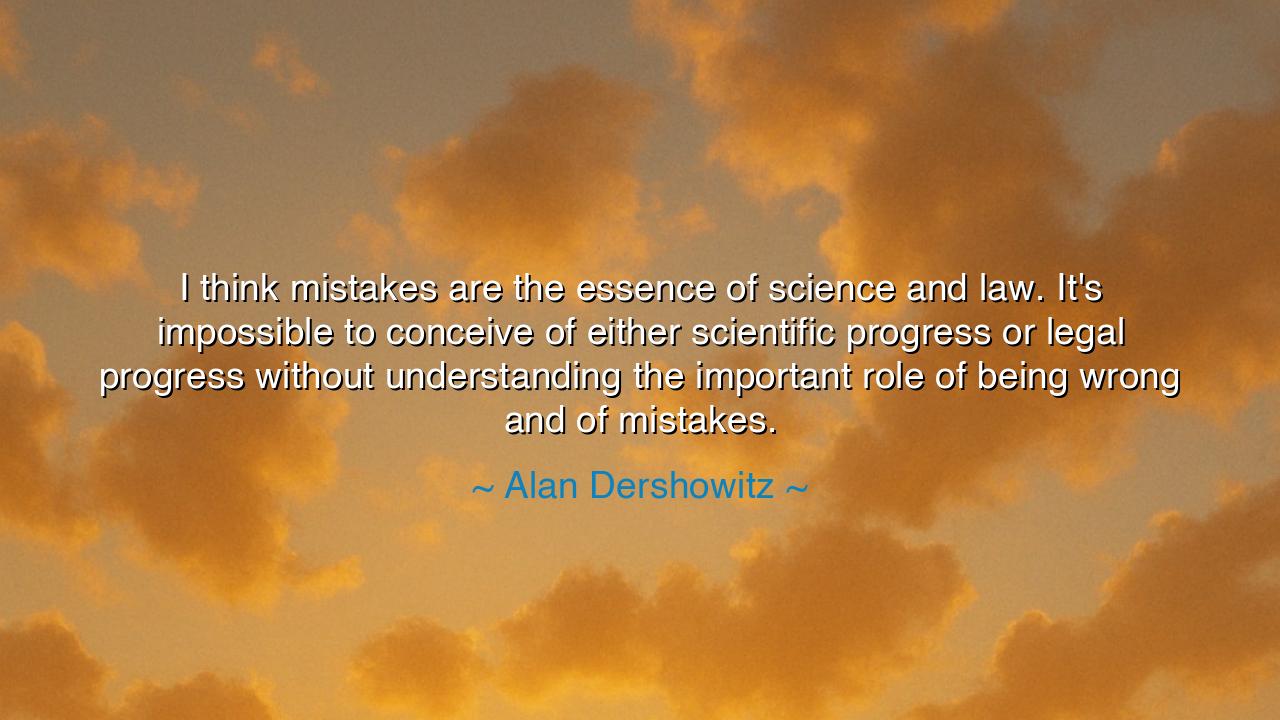
I think mistakes are the essence of science and law. It's
I think mistakes are the essence of science and law. It's impossible to conceive of either scientific progress or legal progress without understanding the important role of being wrong and of mistakes.






There are truths so profound that they humble the proudest of minds, and among them is the wisdom of Alan Dershowitz, who said: “I think mistakes are the essence of science and law. It's impossible to conceive of either scientific progress or legal progress without understanding the important role of being wrong and of mistakes.” These words, though spoken in the modern age, carry the echo of the ancients — for they remind us that human fallibility is not a curse, but a teacher. In science and in law, where mankind seeks to uncover truth and uphold justice, error is not the enemy of wisdom, but its midwife. Without mistakes, there would be no discovery; without failure, no refinement; without being wrong, no way to know what is right.
The origin of this quote rests in Dershowitz’s long life as both a scholar of law and a thinker on morality. As one of the most renowned lawyers and professors of the modern era, he saw firsthand how both legal reasoning and scientific inquiry are bound by the same paradox: they advance not through certainty, but through correction. The courtroom, like the laboratory, is a place where humanity wrestles with imperfection. The scientist tests a theory, and through failed experiments, refines it toward truth. The jurist interprets the law, and through mistakes — wrongful convictions, unjust rulings, flawed assumptions — the system slowly grows more just. Both realms, though different in form, share the same sacred humility: the understanding that to err is human, but to learn from error is divine.
This is no modern revelation, but an ancient one. The philosophers of Greece understood that truth is born from questioning, not from blind faith. Socrates, when accused of corrupting the youth, claimed only to know that he knew nothing — and in that confession lay the seed of all wisdom. Similarly, in the Roman courts, the great orators knew that justice was not fixed in stone, but living — shaped by debate, precedent, and revision. Even the prophets of old, in their quest for righteousness, stumbled and rose again. Dershowitz’s insight stands in this same lineage: he calls us to recognize that progress — whether in the courtroom or the cosmos — is built upon the ruins of our past mistakes, each failure a stepping stone to greater understanding.
Consider the story of Galileo Galilei, the man who defied the might of the Church by claiming that the Earth moved around the Sun. His “mistake,” as his accusers called it, condemned him to silence and imprisonment. Yet history revealed that his so-called error was truth itself. His trial, like so many before and after, proved Dershowitz’s point — that both science and law are flawed human endeavors, evolving only through confrontation with their own blindness. Galileo’s courage forced both disciplines to face their weakness: the temptation to believe that authority is infallible. From his humiliation came the slow dawn of reason; from his punishment, the awakening of justice. Thus, in being wrong — or being called wrong — he became the father of modern science.
The same principle applies to the law. In the history of justice, every great reform has been born from acknowledged injustice. The abolition of slavery, the recognition of women’s rights, the protection of the innocent — all emerged because people dared to see where they had erred. A wrongful conviction, once revealed, becomes a torch in the darkness, illuminating the flaws of the system and forcing it to evolve. Dershowitz, who spent his career defending both the guilty and the misunderstood, knew that the law’s strength lies not in its perfection, but in its capacity for self-correction. To deny error is to halt growth; to embrace it is to honor truth itself.
But to understand the role of being wrong is not merely an intellectual exercise — it is a moral discipline. It requires humility, courage, and a love of truth greater than the love of pride. The scientist who publishes his failed experiment teaches more than the one who hides his errors. The judge who admits the limits of his power preserves justice better than the one who pretends omniscience. To recognize error is to affirm that truth is not owned, but pursued; not possessed, but discovered again and again through struggle. In this, the path of science and the path of law are the same: both are journeys through imperfection toward enlightenment.
And so, the lesson that Dershowitz offers to the generations is clear and timeless: do not fear mistakes — revere them. They are the forge in which wisdom is tempered. In your work, your judgments, and your understanding, do not cling to the illusion of certainty. Question, test, doubt, and revise. For only those who have the humility to be wrong will ever glimpse what is truly right. The greatest scientists, the noblest jurists, and the wisest souls are united by one trait — not their infallibility, but their reverence for error as the path to truth. Let every seeker of wisdom remember: it is not the absence of mistakes that makes us just or wise, but the courage to rise from them, again and again, with clearer eyes and a truer heart.






AAdministratorAdministrator
Welcome, honored guests. Please leave a comment, we will respond soon